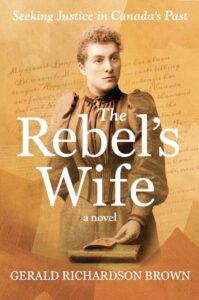Val's Book Reviews

The Rebel’s Wife
by Gerald Richardson Brown
Vancouver: Granville Island Publishing, 2025
$24.95 / 9781989467794
 Based on a true story, Gerald Richardson Brown’s book The Rebel’s Wife is set in the young colony of Upper Canada during the Rebellions of 1837-38. This was a turbulent period in Canadian history.
Based on a true story, Gerald Richardson Brown’s book The Rebel’s Wife is set in the young colony of Upper Canada during the Rebellions of 1837-38. This was a turbulent period in Canadian history.
The protagonist, Maria Wait, the titular wife, sets out on a journey to save her husband, Benjamin, from the gallows. Maria cannot believe that on August 11, 1838, Benjamin and other activists were arrested and sentenced to execution by hanging. She’s determined to appeal her husband’s sentence. The activists were simply fighting for a more democratic rule from the British Colonial Government in Upper Canada that would help their living conditions.
The story is very powerful, but unfortunately the early part of the book is quite complicated and introduces far too many characters and grows confusing in parts. It could possibly have been better told as a nonfiction story as it contains too much telling rather than showing readers. I appreciated the maps that were included, which helped the reader have a clearer understanding of the many locations mentioned.
Nonetheless, as the book continues, Maria’s story becomes stronger. She journeys first to Kingston, Ontario, to appeal Benjamin’s execution sentence. Once she succeeds (after many frustrations along the way), she decides she must then cross the Atlantic Ocean and appeal for a complete pardon by petitioning the young Queen Victoria herself in London. Benjamin has by then been sent, with numerous other prisoners, to the infamous Van Diemen’s Land (Australia), where he is destined to spend the rest of his life. Maria knows that conditions he will be subjected to will be horrific and he might well not survive.

Maria is torn. She has her young daughter, Augusta, to think about and cannot bear to leave her for the lengthy months this journey will take her. Should she risk sailing to England to plead a case that might come to nothing and perhaps then lead to yet another long voyage to Van Diemen’s Land to be near her beloved husband? Or should she stay in Canada with her daughter?
Eventually she makes the painful decision to leave her daughter in the safe and loving hands of her father-in-law Reuben and his wife Abigail with the promise that she will do everything in her power to bring her husband back to Canada to see his daughter grow up.
This is where the story is even more powerful, as Brown (North to Crying Rock) describes the horrendous voyage conditions with turbulent storms and raging winds, while also introducing numerous important characters Maria meets along the way. The descriptive passages are memorable:
On the fourth night out, the ship ran into some nasty wind. Maria woke up feeling nauseous…. the lanterns were still burning, swinging elliptically, the weak light from the oil flame illuminating all the ribs and planks of the lower deck’s hull….
She could hear the sloshing of water and occasional crashes as a big wave came on deck … The noise—the shrieking of the wind through the rigging, the booming of a loose sail, the crash of the ship as it dropped over a wave, the swoosh of a rogue wave as it dropped its crest on the deck—excited her.
This continues in scenes in London depicting danger, disease, poverty and the plight of children, reminiscent of the Dickensian era—
Maria was facing the underside of London life… She stared into the dark hallway, its walls black from soot as her eyes adjusted to the gloom . . . the horror of the scene, the dying woman embracing, under the bed covering when raised, the dead man’s face.
The kindness of comparative strangers helps Maria as she continues her hopeless quest. There is also a brief romantic interlude with a man she meets who is suffering from despair following the tragic death of his wife and child. Together they briefly comfort one another. Along the way, she has also become something of a celebrity known for her bravery and determination to bring justice to her husband. For this reason, many offer her finances to enable her to stay and continue her fight.
Maria is also strengthened by her religious faith and the visions she experiences which encourage her to believe that Benjamin is always beside her and aware of what she is trying to achieve.
There are numerous twists and turns in this story. Some are necessary to move the story along, but some are unnecessary digressions and could perhaps have been omitted. Nonetheless, they are all interesting and colour the story of the author, a UBC emeritus professor. Substance is also added to the story with the inclusion of letters between Maria and Benjamin and the many letters Maria wrote to plead her husband’s case. The Afterword allows readers to understand more about this historical period in Canada’s history.
It would spoil the reader’s enjoyment of this book if the result of her quest in England and beyond is revealed. Suffice to say, once back in Canada, she discovers that Benjamin is now thought of a lost cause. Maria, however, refuses to give up, convinced that he will one day return. Meanwhile, to support herself and her daughter, she takes a teaching job. The ending of the book is a poignant statement.
This is indeed a fascinating chapter in Canadian history which has been given little attention in the past. This author has brought a largely unknown but very important historical event to the attention of an audience who will undoubtedly enjoy and relish Maria Waite’s determined fight for justice in the name of love.

More Reviews by Val
Link to Original Review
“The Ormsby Review, named for pioneering historian and UBC professor Margaret Ormsby, is a remarkable and comprehensive online review of more British Columbia books than you ever imagined existing — the west coast publishing market is lively. It covers fiction, poetry, politics, memoir and much else, as well as a lot of local and west coast history.” – Christopher Moore, September 14, 2020.
Editor and Publisher: Richard Mackie
Mission Statement: The British Columbia Review, formerly The Ormsby Review, is a lively and inclusive Vancouver-based online journal devoted to the literature, arts, culture, and society of British Columbia. Our mandate is to review books by BC-based writers wherever they choose to publish them. We review books from the member publishers of the ABPBC (Association of Book Publishers of BC), but we also review books that are privately printed, self-published, or published by BC writers at publishing houses elsewhere in Canada or abroad. When possible, we also find BC reviewers. Our accessible and authoritative reviews and essays, written by experts in their fields, are packaged as illustrated magazine articles.
The British Columbia Review works with writers, publishers, and literary professionals across Canada to promote books published by BC writers or about British Columbia in all its diversity. We include books by all authors, regardless of race, age, ability, sexual orientation, gender or gender identity, ethnicity, religion, political belief, marital or family status, and/or status as Indigenous, Métis, or Inuit.
The editorial offices of The British Columbia Review are located near Commercial Drive in East Vancouver, in the traditional, unceded, and sometimes overlapping territories of the Musqueam, Squamish, and Tsleil-Wauuth peoples. Indigenous British Columbia, the land on which we live and create, extends over a large area comprising three culture areas, eight language families, and 32 distinct languages. We endeavour to review all books by and about Indigenous BC. Those reviews can be accessed directly here.
